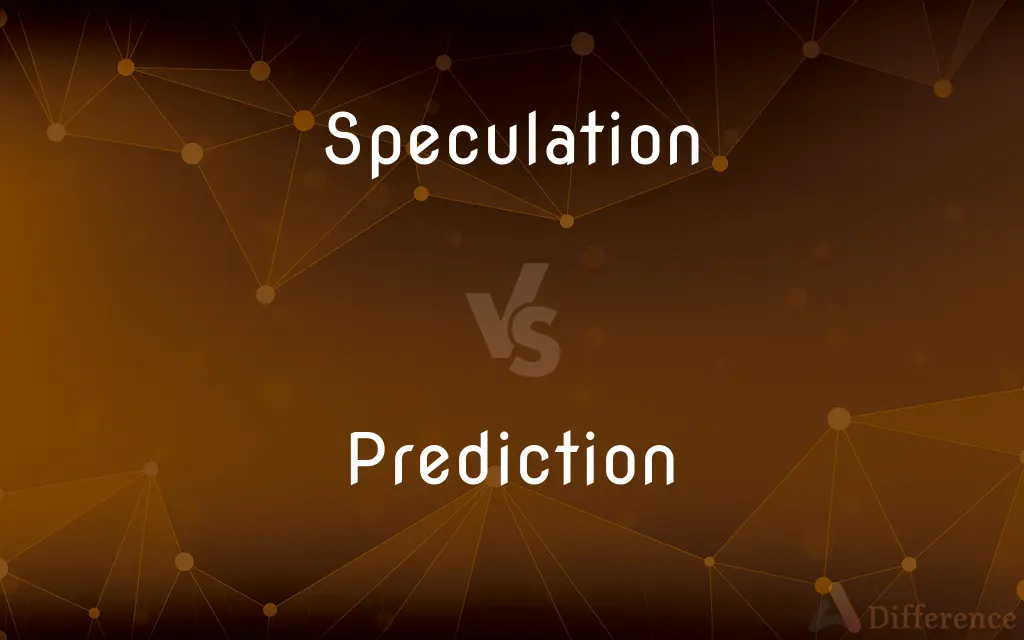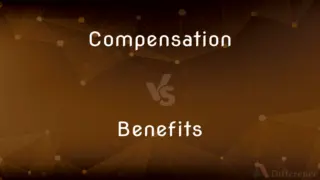Speculation vs. Prediction — What's the Difference?
By Tayyaba Rehman & Fiza Rafique — Published on October 12, 2023
Speculation involves forming a theory without firm evidence, while prediction is a statement about what will happen based on information or analysis.

Difference Between Speculation and Prediction
Table of Contents
ADVERTISEMENT
Key Differences
Speculation and prediction both revolve around future events, but their foundation and intent differ. Speculation is often based on limited, vague, or no evidence, making it more of a guess or conjecture. It's akin to hypothesizing what might be possible without clear indicators to support that view.
Prediction, conversely, typically arises from analysis or data. When scientists make a prediction, they're often drawing on prior knowledge, trends, or patterns. It's an educated guess about future outcomes based on available evidence or past experiences.
Speculation can be seen in various domains like stock markets, where investors buy or sell based on potential future prices. It can be risky, as it's contingent on uncertain events. In literature, speculation prompts intriguing questions, spurring readers or viewers to wonder about potential plot twists.
Prediction is more structured. Meteorologists predict weather based on atmospheric data. Analysts predict economic outcomes by interpreting current trends. In essence, while speculation involves more uncertainty and is less evidence-based, prediction is anchored in tangible data or established patterns.
In sum, speculation is a tentative idea or supposition about the unknown, often rooted in imagination or limited information. Prediction, however, is a more informed statement about the future, grounded in study, analysis, or observable patterns.
ADVERTISEMENT
Comparison Chart
Basis
Often lacks solid evidence.
Based on data or analysis.
Certainty
Generally uncertain.
Relatively more certain.
Risk
Typically involves higher risk.
Lower risk due to evidence-based nature.
Domain Examples
Stock markets, literature.
Meteorology, economic forecasts.
Intent
Exploring possibilities.
Making informed statements about the future.
Compare with Definitions
Speculation
Forming a theory without clear evidence.
There was much speculation about the celebrity's sudden departure.
Prediction
An indication or warning of a future occurrence.
The dark clouds were a prediction of the impending storm.
Speculation
Investment in stocks, property, etc., in hope of gain.
He made his fortune through savvy speculation.
Prediction
A forecast or projection based on analysis.
The weather prediction indicates rain tomorrow.
Speculation
A conclusion or opinion reached by conjecture.
Based on the clues, the detective's speculation was that the butler did it.
Prediction
The act of stating what will happen in the future.
Her prediction about the election results was accurate.
Speculation
Engaging in risky business transactions on chance.
The housing bubble was driven by rampant speculation.
Prediction
An educated guess based on evidence or trends.
Based on past sales, the prediction is that profits will rise.
Speculation
Reasoning based on inconclusive evidence; conjecture or supposition.
Prediction
A prophecy or foretelling of future events.
Ancient cultures had many predictions about the end of the world.
Speculation
A conclusion, opinion, or theory reached by conjecture.
Prediction
The act of predicting.
Speculation
(Archaic) Contemplation or consideration of a subject; meditation.
Prediction
Something foretold or predicted; a prophecy.
Speculation
Engagement in risky business transactions on the chance of quick or considerable profit.
Prediction
A statement of what will happen in the future.
Speculation
A commercial or financial transaction involving speculation.
Prediction
(statistics) A probability estimation based on statistical methods.
Speculation
(obsolete) The faculty of sight.
Prediction
The act of foretelling; also, that which is foretold; prophecy.
The predictions of cold and long winters.
Speculation
(obsolete) An act of looking at something; examination, observation.
Prediction
The act of predicting (as by reasoning about the future)
Speculation
The process of thinking or meditating on a subject.
Prediction
A statement made about the future
Speculation
(philosophy) The act or process of reasoning a priori from premises given or assumed.
Speculation
A conclusion to which the mind comes by speculating; mere theory; notion; conjecture.
Speculation
An investment involving higher-than-normal risk in order to obtain a higher-than-normal return.
Speculation
The act or practice of buying land, goods, shares, etc., in expectation of selling at a higher price, or of selling with the expectation of repurchasing at a lower price; a trading on anticipated fluctuations in price, as distinguished from trading in which the profit expected is the difference between the retail and wholesale prices, or the difference of price in different markets.
Speculation
A card game in which the players buy from one another trumps or whole hands, upon a chance of getting the highest trump dealt, which entitles the holder to the pool of stakes.
Speculation
(programming) The process of anticipating which branch of code will be chosen and executing it in advance.
Speculation
The act of speculating.
Speculation
Examination by the eye; view.
Speculation
A conclusion to which the mind comes by speculating; mere theory; view; notion; conjecture.
From him Socrates derived the principles of morality, and most part of his natural speculations.
To his speculations on these subjects he gave the lofty name of the "Oracles of Reason."
Speculation
Mental view of anything in its various aspects and relations; contemplation; intellectual examination.
Thenceforth to speculations high or deepI turned my thoughts.
Speculation
Power of sight.
Thou hast no speculation in those eyes.
Speculation
The act or process of reasoning a priori from premises given or assumed.
Speculation
A game at cards in which the players buy from one another trumps or whole hands, upon a chance of getting the highest trump dealt, which entitles the holder to the pool of stakes.
Speculation
The act or practice of buying land, goods, shares, etc., in expectation of selling at a higher price, or of selling with the expectation of repurchasing at a lower price; a trading on anticipated fluctuations in price, as distinguished from trading in which the profit expected is the difference between the retail and wholesale prices, or the difference of price in different markets.
Sudden fortunes, indeed, are sometimes made in such places, by what is called the trade of speculation.
Speculation, while confined within moderate limits, is the agent for equalizing supply and demand, and rendering the fluctuations of price less sudden and abrupt than they would otherwise be.
Speculation
Any business venture in involving unusual risks, with a chance for large profits.
Speculation
A message expressing an opinion based on incomplete evidence
Speculation
A hypothesis that has been formed by speculating or conjecturing (usually with little hard evidence);
Speculations about the outcome of the election
He dismissed it as mere conjecture
Speculation
An investment that is very risky but could yield great profits;
He knew the stock was a speculation when he bought it
Speculation
Continuous and profound contemplation or musing on a subject or series of subjects of a deep or abstruse nature;
The habit of meditation is the basis for all real knowledge
Speculation
Contemplation or consideration of a subject.
Philosophers indulge in speculation about the meaning of life.
Common Curiosities
Are speculation and prediction the same?
No, speculation often lacks solid evidence, while prediction is based on data or analysis.
Can speculation be harmful?
Yes, especially in financial contexts, where it can lead to bubbles or losses.
How reliable is a prediction?
It depends on the accuracy of the data and the robustness of the analysis.
Do predictions always come true?
No, predictions are educated guesses and can sometimes be wrong.
Why is there speculation in stock markets?
Investors speculate on stock prices, hoping to buy low and sell high.
Who often makes predictions in daily life?
Meteorologists, analysts, and even common individuals when planning.
Is speculation limited to financial contexts?
No, it can appear in various contexts, including discussions or literature.
Is all speculation baseless?
Not always; speculation can be educated but lacks the certainty of prediction.
How are predictions used in science?
Scientists use predictions to test hypotheses through experiments.
Can speculation be based on some evidence?
Yes, but it's generally less concrete than the evidence for predictions.
Why do some people avoid speculation?
Due to its uncertainty, some prefer evidence-based decisions.
Is speculation always risky?
Often it is, especially when the outcomes are uncertain.
Can a prediction be based on intuition?
Yes, though it's more reliable when based on data or evidence.
How can one make accurate predictions?
By relying on solid data, using robust analytical methods, and considering past trends.
Are predictions always about the future?
Primarily, but they can also infer missing past or present data.
Share Your Discovery

Previous Comparison
Cool Whip vs. Whipped Cream
Next Comparison
Compensation vs. BenefitsAuthor Spotlight
Written by
Tayyaba RehmanTayyaba Rehman is a distinguished writer, currently serving as a primary contributor to askdifference.com. As a researcher in semantics and etymology, Tayyaba's passion for the complexity of languages and their distinctions has found a perfect home on the platform. Tayyaba delves into the intricacies of language, distinguishing between commonly confused words and phrases, thereby providing clarity for readers worldwide.
Co-written by
Fiza RafiqueFiza Rafique is a skilled content writer at AskDifference.com, where she meticulously refines and enhances written pieces. Drawing from her vast editorial expertise, Fiza ensures clarity, accuracy, and precision in every article. Passionate about language, she continually seeks to elevate the quality of content for readers worldwide.
















































